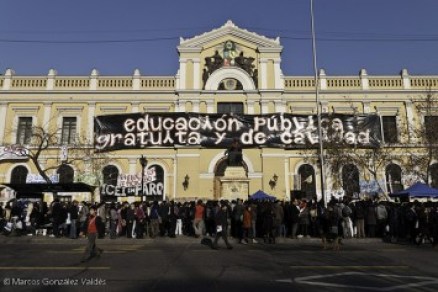What’s going on in Chile is this: Chilean students are at war with their government. In a nation that has the world’s largest wealth inequality gap and a student debt rate to match, students are rising up against the administration of billionaire president Sebastian Piñera to demand free and fair education.
Chile has a number of admirable credentials with regards to its educational system. It’s one of the most rapidly expanding in Latin America. The university population has exploded in the last 20 years from about 200,000 to 1 million. The generation that is participating in higher education today is higher than it’s ever been, with 70% of students being the first in their families to be enrolled in college. But the expansion has been far too rapid with far too little support from the federal government, which today is viewing education as less of a tool and more of a commodity.
The booming student population since the country’s transition to democracy would normally be regarded as an overwhelmingly positive sign of a stable and thriving population, except for the fact that there has been little change made to accommodate the changing socioeconomic landscape of the student population. While the end of the dictatorial Pinochet era birthed huge economic and democratic growth, it also failed to recognize the tools that would be essential for a sustainable future in Chile. Most universities are private, and no new public universities have been built.
The students, led by Camila Vallejo, have created a litany of demands, but most importantly, they feel that the government must put an end to for-profit education and put their support behind public schools. Currently, public institutions are financed largely through tuition, which not only severely limits who is able to attend them, but also the possibilities of expansion. Not to mention that such funding policy negates the point of a public education anyway. Faced with such circumstances, most students are forced to take out loans with an expected return of 6.4%, and with the monthly minimum wage set at $385 – $100 less than the average monthly college tuition – it’s little wonder that there is unsupressable outrage.
Protests began in May of this year and have been occurring since, growing each time and continuously rebuffing proposals from the government. Using both violent and non-violent tactics – first occupying school building and campuses – Chilean students were able to attract the attention of the government, which has agreed to some compromises but has also insisted on maintaining the legality of profiteering in education.”We all want education, healthcare, and many things for free, but I want to remind them that nothing is free in this life. Someone has to pay,” said Piñera in August during a speech he gave while signing a new education bill, which the students are currently demanding be put on hold.
High school and college students are joined in this protest by professors, laborers, and the majority of the population, 82% of whom supported their message at its peak (the number is currently at 67%), and only 26% of whom support President Piñera.
One of the more notable aspects of this movement is its leader, Vallejo, the president of the University of Chile’s student union, and only the second female president there’s ever been. Charismatic, capable, tirelessly dedicated, and self-aware, Vallejo knows her power, and knows that it is the power of the students. She knows she’s young, but sees that not as an obstacle but rather a tool for envisioning change. The media won’t stop telling her she’s beautiful, and she takes every bit of that attention as an opportunity to teach. A woman as a leader is a revolution in itself, and it speaks volumes about the kind of change that Chile is ready for.

We do not want to improve the actual system; we want a profound change – to stop seeing education as a consumer good, to see education as a right where the state provides a guarantee.
This is not a story about a singular stand against unfair education policies. This is not a story about one leader. This is not a story about an isolated uprising in a distant country. This is a story about systematic injustice that is not only making the present difficult but the future unimaginable, and it’s a story about us, too. The rate of income inequality in the US is fourth in the world. Students in Chile graduate with an average of $40,000 worth of debt to the public school system, and the United States isn’t doing much better. As the debt rates grow greater, the rewards become more distant. A degree is no longer a guarantee (though it will almost certainly guarantee you go into debt), and a job no longer implies a future. More likely than not, you’re going to spend a lot of time in your life helping someone else get rich. And that’s what the future looks like right now.
Education is hard because it’s an investment. And an investment has implications and makes assumptions about the future. And in a country that goes to war and foots future generations the bill and that goes into debt on our generation’s social security dollars, it’s hard to imagine putting an investment in the future. And for the people in this country who are either jobless or overworked, it’s hard to find time or resources to organize. The system of rewards that made education worth it to begin with is still in place, but its foundation is unstable. A job doesn’t mean what it used to, and so neither does an education. And with many public university systems steadily raising tuition and lowering financial aid, individualized frustration has the potential to turn into large-scale dissent in the United States as well.
Students last marched on Thursday, Sept. 22, turning out 180,000 protesters in Santiago and thousands more in other major cities. Are those numbers big enough that they’re impossible to ignore? And if Chile’s students succeed in convicting its government of failing them, what does that mean for other nations with a similar problem? Maybe it’s true what Piñera says, and someone needs to pay, but if these students have anything to do with it, it’s going to be the people with the money and the power.




It’s amazing that they have such popular support, and I hope that they can wield it to their advantage. At the very least, it’s good that the struggle is visible, and gaining international attention. Education debt and disparity is a huge problem in the United States, but it often gets glossed over or shoved to the side in the wake of other issues. Maybe this will serve as a reminder that education needs constant support.
Also, Camilla Vallejo sounds like an incredible leader.
It’s great that Autostraddle has decided to give this some attention!
Chile has always claimed to be the most “western” of Latin American countries, but it is easy to see that this quick jump on to the tracks of modernization is backlashing. I believe that Chile is the only country in South America that doesn’t offer free education in public universities. The concept of free higher education may seem ludicrous to many Americans, but it totally is a possible reality. An indigenous president in Bolivia, a factory worker as ex-president in Brazil and other leftist governments in Uruguay, Ecuador, etc. are surely making the Chilean population realize that there are other (perhaps better) roads to democratization.
I echo Mari’s comments. I hope this momentum spill over into the U.S.
Also… I am proud of Latin America. Not because of Chile but because of their commitment to social justice.
Pingback: Autostraddle — Educar, No Lucrar: Students In Chile Demanding … | ALNOORIANS
“A degree is no longer a guarantee (though it will almost certainly guarantee you go into debt), and a job no longer implies a future.”
Jeez, I wish I didn’t know how true this is. I wish my generation here in the US would get angry at the bullshit we’ve been sold and the debt we are paying for it, while the banks get bailed out and their CEOs get raises.
woof, don’t i know it. it’s sort of eerie how much the idea of insurmountable debt has become in the US. it’s like complete surrender accompanied by mild annoyance. like, i can’t believe that people don’t find it completely outrageous the amount of money students and their families pay to private institutions, while funding for state schools gets pushed to the side, resulting in tuition hikes. as someone who went to, and dropped out of, of the the country’s most expensive private schools, i can pretty confidently say that i didn’t feel like i was paying for a quality education; i felt like i was paying for the brand name that would come on my diploma. what a waste. not to mention that with today’s economy, almost no brand name on a diploma will guarantee you a job.
and so when you say that you wish your (our) generation would get angry at all that bullshit, i think that’s a lot of what occupy wall st is about. although their messaging may be sort of nebulous and their tactics sometimes misinformed, there’s a lot to be said about the fact that the protest is becoming more relevant as time goes on. of course the messaging is unclear — there’s a lot to be angry about. but as time goes on, support keeps growing. ny’s largest labor unions have recently pledged to join the action, which is going to increase the numbers and make more universal the cause.
admittedly, i was a little frustrated with the disorganization of the movement, but as it grows, i’m very proud that to know that it was started by young people. as vallejo said, “There are huge levels of discontent. It is always the youth that make the first move…we don’t have family commitments, this allows us to be feer. We took the first step, but we are no longer alone.”
unnecessarily long response is unnecessarily long. #feelings
I was more frustrated that the media was not giving enough attention to Occupy Wall St. seeing as they have given EXTENSIVE media coverage to the tea party when they were first starting off with their message of “Too much Big Government,” while I may not know the exact demands of the folks behind Occupy Wall St. I do have a good sense that it is fighting the corruption in the private and governmental industries. so to some degree the exact details of their demands are being flushed out as we speak. it is also very inspirational to see youth organizing because for a very LONG LONG time (back when Bush was president) everyone appeared to be apathetic.
i too agree with you so i was very happy to see this article on Autostraddle.
It’s not just the universities that are an issue – it’s the lower level schools as well. Public schools in Chile are terrible, meaning that anyone who wants to pass the PSU (Chilean college entrance exam) basically has to go to a private school. And they’re expensive, too. It’s really a giant problem from the bottom up.
My only problem with this movement, and I hate to consider it a part of this revolution, is that some of the protestors (or people just caught upnin the general excitement of the protests with no real connection to the struggle, as I theorize) are getting away with some serious vandalism and destruction with little more than a slap on the wrist. Visibility? Absolutely. Passion? Hell yeah. But making your cause look juvenile by destroying public and private property? No.
i agree. i’ve always felt that, if anything, problems within higher education are very much indicative of huge structural problems within primary and secondary education. i feel like one of the reasons why university students are so able and willing to organize is because of their newfound independence, and their often newfound ability to think critically and ask questions to the point of action. that being said, i believe some high school students have been occupying establishments as well.
i think that a radical faction is pretty much unavoidable, if not actually necessary, to any movement as large in scale as this one. and while it may make the cause look juvenile, it is in some ways just a reaction to the violence that police have used toward the students. violent action, while not always conducive to systematic democratic change, is a necessary expression of the visceral and honest reaction from a youth feeling betrayed by their government and their educational system. i think it’s a victory that these actions haven’t defined the movement, nor have the students turned on each other to debate these actions in a way that is distracting.
wooooorddd!
That’s why I’m so hesitant to go to school right now. I’m in community college and almost transferred last semester, but changed my mind at the last minute. I guess I’m just holding on to the hope that something will change. Affordable education (and healthcare) should be accessible to everyone. I don’t get why that’s so hard for governments to understand. Good luck to the students of Chile.
socialists+ have a gateway into my pants.
i’m not gonna lie, this prompted me to google ‘socialist pickup lines.’ unfortunately, most of them are penis jokes :/
dont worry, im sure they like all pickup lines equally.
I though that I get into a wrong website when I saw the tittle in spanish…
But, about the new..I’m 100% with the student I’m one of them, but the thing is that their methods aren’t the appropriate…If they want the people empathy. They have to stop the riot…They have to stop the violence of their protest, that doesn’t solve anything
I too am really glad to see this get coverage on autostraddle. Thanks for this.
I have to say that while I agree there are a lot of issues regarding education in Chile, I do not support the student movement. tuition should be cheaper,yes, and quality should be higher, but that’s about all I agree with. I don’t agree with the riots or occupying the schools or the attitude of most students who talk and talk and talk about their rights and forget their duties. like actually studying. cause most people involved are more than willing to fight hard for the right to study but none of them are willing to actually study and waste their very expensive time at uni by partying and paying no attention in class, and if that is all you want to do I don’t see why you bother going to uni in the first place.
so I have to say it kinda pisses me off to see the sort of people who’ve spent their lives calling me a nerd and then asking me for help all of a sudden care about education.
beside my problems with the actual movement I think this article is a bit idealistic in the sense of only showing the good parts of the movement. like showing camila vallejo as a kind of heroine when she’s not. nor does she represent the majority of the student body. I’m a bit disappointed not to see a mention of giorgio jackson, the other leader of the movement who’s far more realistic and well, smart, plus nowhere as political as camila is.
it also doesnt mention how rigid the student movement is being, unwillling to compromise in anyway, despite the authorities efforts to find a compromise or start a dialogue. how students are being bullied into not going to class “for the greater good”
it’s good to want to change things but I don’t agree with hurting personal liberties for a cause.